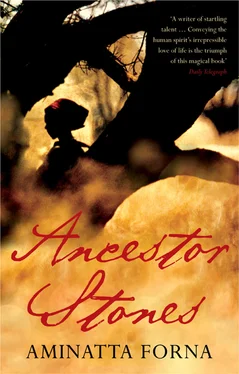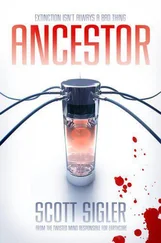Supper eaten, mama binds me to her back. Holding me squashed against her breasts, bends over, twists my body round her own. On her back now. I know better than to fall off. Cling to her with my thighs, my fists. She drapes the cloth across my buttocks, holds it in her teeth. Ties two ends tight round her waist. Hitches the other corners up under her armpits — a knot above her breasts.
I’m part of her. Feel her flesh, muscles, sinews — walking, working, out in the plantation pruning trees. Feel her heart quicken and slow. I know who scares her. I know whom she loves. When my father passes she stiffens, drawing air into her nostrils — like an oribi we saw drinking at the river — and quivering beneath the stillness of her skin. We carry food to the workers at the plantation. She unwraps the pots, ladles soup on rice. Men come forward. Pa Foday, he comes close. ‘Momo’ , he says. Thank you. Feel the creak of the cloth against her ribs as she catches her breath.
Evening time we slip away. Slip away to the secret bush. Walking quickly. Past houses, past gardens. Into the groves. She walks like a queen. Or like a woman on her way to meet a lover. Where the path from the rice fields meets the path from the stream, see the gap in the trees? See the cotton tree high above the rest? That’s where we’re headed. We follow an invisible path. No one can follow us.
Women are already here. So many women. Talking. Talking women’s business, they call it. We don’t care to talk. Not so very much. We wait to dance. When the talk is finished the drums start, the singing. And the dancing. We dance for the elders and the younger women, too. Whirling, whirling. Round and around. Round and around we go.
We dance until the light comes up and dances too, across a horizon flat and empty as a stage. And then we walk quickly back to the village, collecting sticks of firewood as we go.
Then I learned to talk. She stopped taking me with her. I might repeat secrets told, women’s special secrets. Wait, she said, until your turn comes. That was one time.
Then there was another time. The time when the dancing stopped. And when I said her name, a space opened up that I could fall into. Silence. Silence after her name. Silence where the music used to be. Once women bound their hands to drum all night. Afterwards they met in secret, real secret. Silent secret. Away from the eyes of men. Away from Haidera. But when they tried to dance, they couldn’t. The steps were gone. They had followed my mother when she went away.
I used to read the things written about us. These weren’t the books the nuns approved of. One book was by a Very Famous Author. Oh, all the writing on the back said how good this book was. This famous man lived in our country for a short time and then he wrote a story that would make sure nobody ever wanted to come here. A story about a man who arrived on these shores and lost his faith. Many years later I read another book by the same writer, about a woman who has to choose between her god and the man she loves. When I read that book I felt a pain, like I had been stabbed in my side. I felt this woman’s terrible choice as if it was my own. Because I remembered my mother and how she was forced to deny her own faith.
A woman has no religion. Have you heard people say that here? A woman has no religion. And maybe it’s true. We change our faith to marry and worship to please our husbands. But it was not always so.
In those days they were always coming to convert us. The Muslims from the North, the Christians from the South. We deserted our gods. But nobody wrote stories about that. Instead they congratulated themselves on how many souls they had saved. My own soul was saved twice. But my mother. My mother would not yield. And to this day nobody has ever come to me and said she was noble and righteous to do so.
We did not have a house of our own. No. We slept in a back room of my father’s house. Small, not so light, one window. It looked out on to the alleyway where old men came to smoke. The tobacco smelled like burning flowers. Not such a quiet room either. There was the women’s cooking circle behind us, too. Odours of simmering plasass , the scent of tobacco and talking, old men’s voices and women’s voices. Hush!
A plain room. But mama tried to make it into something pretty: striped country cloths on the floor, cloth dyed red with camwood on the walls. Lattice shutters over the windows. In the corner the box with her things in it, the things she brought when she came here.
1931. Yes, it was 1931. We didn’t count years in those days. That came later. Who was to say where to begin? What year was the first? So we began in many places: the Year the New Chief Came Out of Seclusion; the Year We Came to this Place; the Year the River Rose and Snatched Away Houses in Old Rofathane; the Year the First Coffee Beans Ripened. The Year of the Locust Disaster. That had been the year before. The villagers lit fires between the rows of trees and draped fishing nets over the branches to protect the beans. I was young. I thought a locust was some kind of fish that swam through the air. In the morning the trees were saved; there were crisp locusts scattered across the land and the air filled with their odour.
Yes, we remembered years by the things that happened. Important things.
So why do I say 1931? I’ll tell you. Because that was the year of Haidera. That much I know. I read it in a book by a professor of history. An English professor, but who wrote our history, if you understand me. And he said Haidera came in 1931. So I said to myself, well then that is the year of my mother’s story too. The man who wrote that book, he did not think much of Haidera. A fanatic. That’s what he wrote in his book. That Haidera was a fanatic. He said not so many people followed Haidera. But he was wrong. There were many people who loved Haidera Kontorfili.
That year was also the Year My Teeth Fell Out. A warm evening in the dry season. My sisters were out, walking round the houses with their age mates. Arms encircling waists. Calling greetings to the people sitting at the front of their houses. ‘I pray good evening, aunty.’ ‘Good evening, uncle.’ ‘How are you?’ ‘Thanto a Kuru.’ I thank God. ‘Remember me to your mother.’ ‘Yes, aunty.’ Or else they were sitting by the river, whispering into other girls’ ears. I was the youngest, too young to go with them. The one who called me, he returned. And the next one too who would have been another sister. Two children missing in between, like the space in my row of teeth.
I lay at home licking my gums. That day I told my mother I was sick and she gave me mimosa tea to drink. I sipped air in with my tea, through the gap in my mouth. The tea blistered my gums, already rough from sucking green mangoes with Bobbio, the Boy with No Voice. Lying in the fields sucking green mangoes. That’s what I did the day before. But I don’t tell such things to mama. I let my eyes follow her. I like to watch my mother. To me she is beautiful.
Today, as on other days, this is what she does:
She goes to the box and feels among the layers of clothes. She takes a tin, a tin wrapped up in red poplin, stitched with cowrie shells and leather-bound sassa . Fearful amulets to protect what’s inside. There is writing on the side. It says: ‘Woodbines’. Just so you know. For myself, I only knew that later. On the floor she folds her legs beside her and empties the cigarette cup. Pebbles and stones tumble on to the floor, she spreads them out with a hand like a fan.
There are seventeen of them. This I know. Because sometimes when I am left alone I go to the chest and take them out for myself. I empty them into my palm, feel their weight, listen to the noise they make, like they are talking to each other. Or to me. A pinkish pebble, curved in one place, flat on the other and inside dark and glistening like a sliced plum. A big one, flat and grey with a dimple that fits my thumb, just so. A dark stone, shaped just like a cigar and veined too, like a tobacco leaf. I hold it to my lips and copy the men outside. A cream-coloured pebble, with pale lines intersecting across its length and width: paths and a crossroads. A translucent crystal. A triangular stone, dusty like chalk. A black moon-rock. There are others. Ah, my favourite: white, five-sided, smooth as my skin, but rippled as the sand on the windward side of a dune.
Читать дальше












